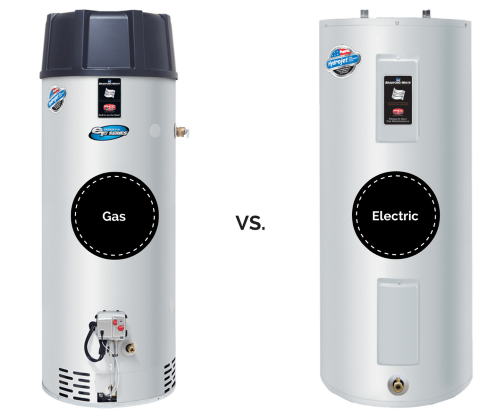Water heaters are those unsung heroes in our homes that quietly provide us with cozy baths. Have you, however, ever questioned what kind of water heater you own? Is it powered by gas or electricity? You may not think too much about it, but it’s important, as it can impact your utility bills and maintenance routines.
What Does A Gas Water Heater Look Like
Gas water heaters have a distinct appearance that makes them different from their electric replicas.
In a gas water heater, there would be a large metal tank with pipes connected at the top. You’ll find a gas burner assembly on the bottom of the unit, often covered by a metal plate. This is where the actual thing happens – the burner heats the water stored in the tank. And it provides you with a stable supply of warm water.
The gas water heater will also have a flue. It’s basically a metal chimney-like structure that vents out the byproducts of combustion. Keep an eye out for a pilot light, a small flame that indicates the presence of gas, and the readiness of the system to heat water.
Read: Is it Cheaper to Leave Hot Water On All The Time?
What Does An Electric Water Heater Look Like
Unlike gas water heaters, electric water heaters lack the telltale signs of a gas-powered unit.
Instead of a burner assembly and flue, an electric water heater has electrical elements located near the bottom of the tank. These elements heat the water directly, eliminating the need for a combustion process.
Look for electrical panels and access covers on the side of the tank. Unlike gas water heaters, electric models won’t have a pilot light. Instead, they may have temperature control panels and reset buttons. The absence of a gas line and flue is a clear indicator that you’re dealing with an electric water heater.
How To Tell If Water Heater Is Gas Or Electric
From the above-mentioned details of gas and electric water heaters, you probably now have quite a clear idea about these. So, telling whether your water heater is gas or electric is definitely not rocket science. Here’s a quick guide to help you figure it out:
Check the Power Source– Pipe or Power Cord?
Look around the water heater for a power cord. If you find a substantial power cord connected to the unit, you have an electric water heater.
Inspect the area near the water heater for a gas supply line. If you locate a gas pipe, your water heater is powered by gas.
Check the Burner Assembly or Electrical Elements
Check on the side of the water heater and open the access panel. If you observe electrical elements or a control panel, it’s an electric water heater.
Remove the lower access panel. If you find a burner assembly at the bottom, you’re dealing with a gas water heater.
Look for a Flue
Gas water heaters have a flue– a metal pipe for venting combustion byproducts. The presence of a flue indicates a gas water heater.
If there’s no visible flue, it’s likely an electric water heater.
Check for a Pilot Light (Blue Flame)
Look for a small, constantly burning flame known as the pilot light. The presence of a pilot light is a clear indicator of a gas water heater.
The absence of a pilot light indicates an electric water heater.
Does A Gas Water Heater Need Electricity?
While its primary source of energy for heating comes from natural gas, a gas water heater does need electricity in this modern era.
Traditional gas water heaters consist of a standing pilot in them. When your water has to be heated, the gas burners are lit by the steady burn of this pilot light. The heating source is activated when cold water reaches the tank, heating the water that is required for usage. Therefore, electricity is not needed to run this kind of gas water heater.
Modern gas water heaters, on the flip side, have hot surface ignition rather than any standing pilot light. An electrical source is needed for this system’s resistance element, which lights the pilot and ignites the gas burners.
One more gas water heater we can take into account is Gas tankless water heaters. Gas or electricity are the two fuel sources for this type of heaters, which heat water as needed. Gas-powered machines typically feature electronic sensors and controls, which do need electricity to operate.
Which Is More Energy-Efficient?
When it’s about energy efficiency, electric water heaters are commonly considered more efficient. They convert almost all the electricity they consume into heat, minimizing energy waste.
On the other hand, gas water heaters can lose some energy through the venting process. However, the overall efficiency can depend on factors like local energy prices and the specific model of the water heater.
Read: 15 Best Devices to Lower Your Electric Bill
Which Is Right For You?
Picking up between a gas and electric water heater depends on various factors. Like your home’s infrastructure, energy costs in your area, personal preferences, etc.
Consider Gas If:
- Your house has a natural gas line.
- Gas prices are lower than electricity in your area.
- You prefer faster water heating.
Consider Electric If:
- You don’t have access to a gas line.
- Electricity is more cost-effective in your region.
- You want a simpler installation process.
How To Choose A Hot-Water Heater?
Though it pretty much depends on your preferences and lifestyle, here are some common facts you should check before choosing your hot-water heater:
Read: Do Water Heater Timers Save Money?
- Find out what kind of fuel source is in your house.
- Determine the first-hour rating (FHR) that you want.
- Choose the size of water heater you require.
- Compare which one is energy-efficient
- Consider the cost and efficiency of the heaters.
Conclusion
Knowing if your water heater runs on gas or electricity is actually essential for maintenance and energy analysis. So, when selecting your water heater, always consider your household demands, cost, efficiency, and available resources. Whether you choose the efficiency of electricity or the dependability of gas, a well-maintained water heater guarantees comfort in your everyday life.


